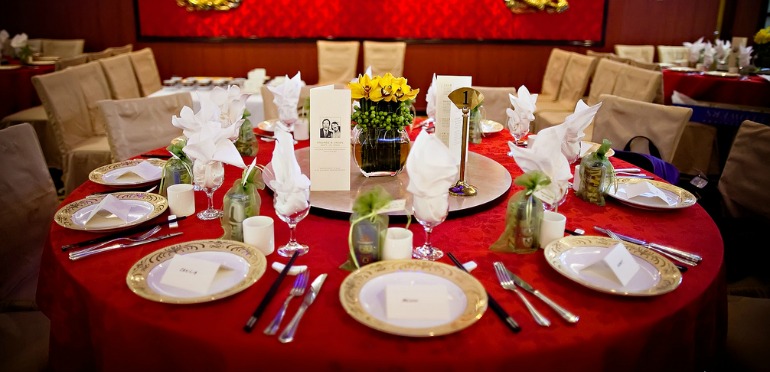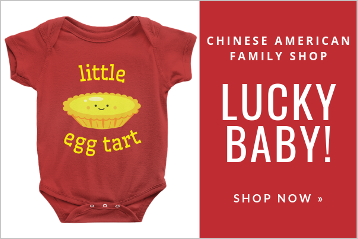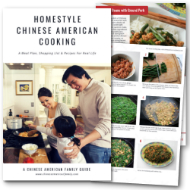Are you headed to a Chinese wedding this summer, either as a guest or as a member of the wedding party? Ling-Mei Wong, editor of the Sampan Newspaper, draws from her own personal experience to help you know what to expect, whether the wedding is here in the United States or abroad.
Do you have something to say about everyday Chinese American culture, food or family life that would make for a great guest post? Get in touch through the Contact page to learn about having your writing featured on Chinese American Family.
Your turn! What are your experiences attending Chinese weddings in the United States? I’d love to hear from you in the comments section below!
Four differences between Chinese and American weddings
By Ling-Mei Wong
My wedding took place nearly three years ago, which was one of the happiest days of my life. We had two events: a church wedding in Boston and a dinner reception in Taipei. I’m a Taiwan girl and my husband grew up in Hong Kong, so our parents helped us tremendously to apply Chinese wedding etiquette. Here are four differences between Chinese and American wedding customs that I learned through my experience.
#1 Chinese vs. American difference: Wedding-related costs
My American girlfriends lament about being in the wedding party, as bridesmaids generally pay for their own dresses, hair, makeup and airfare. As wonderful as it is to celebrate a dear friend’s special day, wedding costs add up quickly. Not so for a Chinese wedding! When I married my husband, we paid for our best man’s overseas flight and gave him an extra “red pocket” envelope of cash for his trouble, including his tailor-made tux. When I was a bridesmaid for two Chinese friends, my dress, alterations and makeup were included, along with a red pocket. This is not so much to reimburse your wedding party like an expense report, but more a goodwill gesture.
#2 Chinese vs. American difference: Banquets
Dinner for an American wedding is typically a three-course affair with an appetizer, entree and wedding cake. For a Chinese wedding banquet, expect to see at least 10 courses of food. Each dish has a unique meaning, such as long-life noodles (長壽麵) for a long and happy union or fish (魚) for plenty (餘). Don’t expect to finish each dish — guests generally take a bite of each symbolic dish and pack up the leftovers. Our American wedding guests were stuffed after the first three banquet dishes and couldn’t fathom why the food kept coming. And there was still cake at the end, too!
#3 Chinese vs. American difference: Cash gifts, not registry gifts
Cash is king in Chinese culture. We exchange envelopes of it for Chinese New Year and the same red envelope is a most practical wedding gift. In the States, giving cash is generally considered tacky. Chinese couples in the States may set up a registry for guests unfamiliar with red envelopes. But otherwise, it’s all about the cash. The amount of cash should be enough to cover the banquet meal. So if a table of 10 is $500, each guest should prepare at least $50 in the red envelope. (Don’t forget tax and tips as well.) Older relatives and closer friends will often give more, but there’s not an exact formula for wedding red envelopes. Some symbolic amounts to give for a wedding are $88 (eight or “八 ba” rhyming with “發 fa” in Mandarin to have good luck) or $99 (nine or “九 jiu” has the same sound as longevity “久”). The number four is considered unlucky, as four (四) has the same sound as “death” (死). So give as you’re comfortable, just not in amounts with the number four!
#4 Chinese vs. American differences: Guest list length
An American wedding with more than 100 guests is considered a large affair. For Chinese weddings, the newlyweds can expect easily twice as many people. I was a bridesmaid at a wedding with 500 guests, with the bride and groom toasting each banquet table all night long. At least the newlyweds ate first! Chinese culture is family-focused and a wedding is about including as much family as possible. Many times, the parents’ friends and even professional contacts are invited to share in the happiness. Red envelopes mean more guests and more cash, but it’s not uncommon to hear of newlyweds going into debt to secure a venue in advance. If you wonder why the newlyweds seem to have an exceptionally packed venue, it’s likely guests invited by their parents.
Weddings are a time to celebrate the couple and their heritage. For my wedding, we had a mix of Chinese and American customs — I wore white and dutifully gave red envelopes to my wedding party. For traditional Chinese families, a fortune teller may be consulted to find lucky wedding dates on the lunar calendar, which may fall on weekdays instead of weekends.
Whether you’re planning a Chinese wedding or attending one, the four differences are good to know. Celebrating a new life together calls for a party!
Ling-Mei Wong can be found guzzling boba tea and sampling Asian delicacies. She is the editor of the Sampan Newspaper, New England’s only bilingual Chinese-English newspaper.
—
Chinese American Family is always seeking outstanding guest posts! If you have something you’d like me to feature, visit the Contact page to get in touch — and then submit yours today.





Dena
Hi! I have a story to tell regarding this:
“For traditional Chinese families, a fortune teller may be consulted to find lucky wedding dates on the lunar calendar, which may fall on weekdays instead of weekends.”
My cousin was getting married while I was in high school. The wedding was on a Wednesday. When I brought in a note to the Attendance office to excuse me for the day, they said my note is fake because “Who would have a wedding on Wednesday?!” LOL! I laugh now but back then, it was frustrating. They had to call home to get someone to actually come in to back up the wedding note. My other cousin came to pick me up but wow, that was an eye-opener because I rarely have brush with my school’s admin office.
Also, one note worthy thing to add to the list is the tradition of having a Tea Ceremony. It was a must-have tradition so we crammed it all into one day: Tea Ceremony at both homes, Traditional “I do” ceremony, banquet in a hotel (not restaurant which was the Asian-American cultural mix), dancing. Yes, dancing! 🙂
Wes Radez
Hey Dena, your story made me smile, though I can understand how it took time for that memory to mature from frustration to laughter. Fun to hear how you combined Asian and American on your own wedding day — I love hearing those stories from friends, I hope you’ll share more! ~Wes
Jane
I’m born and raised in the US, but my fiancee is Chinese and lived in China until age 10. Only his mom and one of his cousins live in the US; the entire rest of his family is in China. (Eventually, they will throw us a wedding reception there.) We share our Christian faith and are getting married this September in my family’s church outside of Washington DC.
What small symbols can I include or gestures can I make at our wedding to honor his Chinese heritage, and to make his mom and cousin feel welcome and included into our family?
Thank you for your ideas!
Wes Radez
What a wonderful question, Jane! Past general cultural suggestions (say, planning a Chinese menu for your rehearsal dinner) or symbolism (say, using a double happiness character in your decorations), I’d recommend engaging your fiance’s mother to inquire whether there are any specific family traditions you can incorporate. Also, feel free to email the article’s author (lingmeiwong@gmail.com) with any questions. ~Wes
Katlin
Hello Wes,
Would it be considered OK to give a gift of a bonsai plant to my Chinese friend who has just been married?
Kind Regards,
Katlin
Wes Radez
Hi Kaitlin, it’s a nice gift with positive symbolism. Though bonsai is a Japanese word, this type of tree-growing is actually Chinese (look up Penjing trees). They last a long time, implying longevity for the marriage. ~Wes
Linda Gordon
My daughter is a Scott / Irish / English Canadian marrying into a Chinese family. Her husband to be is Canadian Chinese. She is having a hard time with the meal because there would only be maybe 30 of us and the rest his family. I understand the meal, but we have family members who have health problems which would not allow them to eat the Chinese food without being very ill. How does she put this meal together to make everyone happy on his side and her side without people being sick?
Wes Radez
Hi Linda, I’m not aware of any Chinese foods that cause illness. That said, if you have family members with food allergies or dietary restrictions, those are reasonable to raise to any wedding planner or restaurant, Chinese or otherwise. If, on the other hand, it’s simply a matter of preference, then I’d suggest focusing on helping the bride and groom enjoy their special day by politely accepting whatever they serve. ~Wes